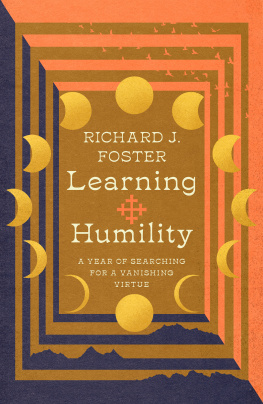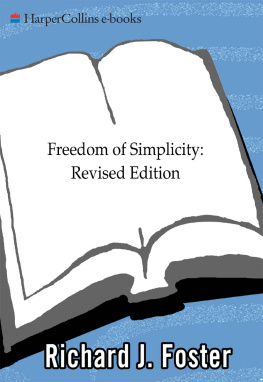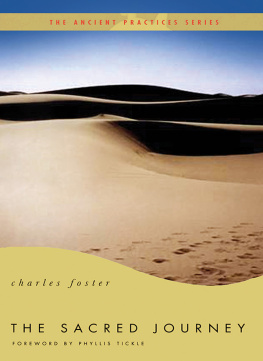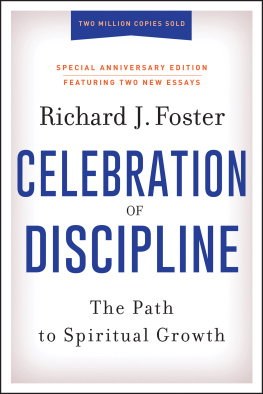To D. Elton Trueblood
In Memoriam
To get the most from Seeking the Kingdom you will need to have ready a Bible, a notebook, and pen.
At times the Reflection will take the form of a number of questions to consider; in other places there will be an exercise or meditation for you to try.
There will be some days where you will find it helpful to write down your response.
Some chapters end with a section for further study these are optional and should only be attempted by those who have more time available.
M OVING I NWARD
N othing is more crucial to our lives or more central to the heart of God than the transformation of the human personality. Paul, that great advocate of human transformation, once spoke of being in travail until Christ be formed in you (Gal. 4:19, RSV ). And in another letter he says, Those whom [God] foreknew he also predestined to be conformed to the image of his Son (Rom. 8:29, RSV ).
We must see it as our highest, most holy taskthis being formed and conformed and transformed into the likeness of Jesus Christ. Unfortunately there is an abysmal ignorance today about the most elemental spiritual ingredients involved in character formation. The following readings have been selected in the hope of helping you understand this process a little better so that you may grow in the grace and knowledge of our Lord and Savior Jesus Christ (2 Peter 3:18, RSV ).
W HAT K EEPS U S FROM P RAYING ?
READING
Fear not, for I have redeemed you ;
I have summoned you by name; you are mine .
When you pass through the waters ,
I will be with you ;
and when you pass through the rivers ,
they will not sweep over you .
When you walk through the fire ,
you will not be burned ;
the flames will not set you ablaze .
For I am the L ORD , your God ,
the Holy One of Israel, your Savior ;
I give Egypt for your ransom ,
Cush and Seba in your stead .
Since you are precious and honored in my sight ,
and because I love you ,
I will give men in exchange for you ,
and people in exchange for your life .
Do not be afraid, for I am with you;
I will bring your children from the east
and gather you from the west .
Isaiah 43:lb5
W e today yearn for prayer and hide from prayer. We are attracted to it and repelled by it. We believe prayer is something we should do, even something we want to do; but it seems as if a chasm stands between us and actually praying. We experience the agony of prayerlessness.
We are not quite sure what holds us back. Of course we are busy with work and family obligations, but that is only a smoke screen. Our busyness seldom keeps us from eating or sleeping or making love. No, there is something deeper, more profound keeping us in check. In reality, there are any number of somethings preventing us, all of which we will explore in due time. But for now there is one something that needs immediate attention. It is the notionalmost universal among us modern high achieversthat we have to have everything just right in order to pray. That is, before we can really pray, our lives need some fine tuning, or we need to know more about how to pray, or we need to study the philosophical questions surrounding prayer, or we need to have a better grasp of the great traditions of prayer. And on it goes.
It isnt that these are wrong concerns or that there is never a time to deal with them. But we are starting from the wrong end of thingsputting the cart before the horse. Our problem is that we assume prayer is something to master the way we master algebra or auto mechanics. That puts us in the on top position, where we are competent and in control. But when praying we come underneath, where we calmly and deliberately surrender control and become incompetent. To pray, writes Emilie Griffin, means to be willing to be naive.1
I used to think that I needed to get all my motives straightened out before I could pray, really pray. I would be in some prayer group, for example, and I would examine what I had just prayed and think to myself, How utterly foolish and self-centered; I cant pray this way! And so I would determine never to pray again until my motives were pure. You understand, I did not want to be a hypocrite. I knew that God is holy and righteous. I knew that prayer is no magic incantation. I knew that I must not use God for my own ends. But the practical effect of all this internal soul-searching was to completely paralyze my ability to pray.
The truth of the matter is, we all come to prayer with a tangled mass of motivesaltruistic and selfish, merciful and hateful, loving and bitter. Frankly, this side of eternity we will never unravel the good from the bad, the pure from the impure. But what I have come to see is that God is big enough to receive us with all our mixture. We do not have to be bright, or pure, or filled with faith, or anything. That is what grace means, and not only are we saved by grace, we live by it as well. And we pray by it. (Prayer)
REFLECTION
What are the things that keep you from praying? You may find it helpful to write a list. There may be obvious factors, such as time and opportunity but also, looking deeper, less obvious hindrances such as your view of prayer or even your mental picture of God:
Bring your list before God in prayer, honestly and without self-justification, confessing what has kept you from spending time with him .
End by rereading the Isaiah passage at the beginning of this section, hearing the words as if God is speaking them to you personally, calling you by name because you are precious in his sight .
T HE F ORGIVENESS OF G OD
READING
Jesus continued: There was a man who had two sons. The younger one said to his father, Father, give me my share of the estate. So he divided his property between them .
Not long after that, the younger son got together all he had, set off for a distant country and there squandered his wealth in wild living. After he had spent everything, there was a severe famine in that whole country, and he began to be in need. So he went and hired himself out to a citizen of that country, who sent him to his fields to feed pigs. He longed to fill his stomach with the pods that the pigs were eating, but no one gave him anything .
When he came to his senses, he said, How many of my fathers hired men have food to spare, and here I am starving to death! I will set out and go back to my father and say to him: Father, I have sinned against heaven and against you. I am no longer worthy to be called your son; make me like one of your hired men. So he got up and went to his father .
But while he was still a long way off, his father saw him and was filled with compassion for him; he ran to his son, threw his arms around him and kissed him .
The son said to him, Father, I have sinned against heaven and against you. I am no longer worthy to be called your son.
But the father said to his servants, Quick! Bring the best robe and put it on him. Put a ring on his finger and sandals on his feet. Bring the fattened calf and kill it. Lets have a feast and celebrate. For this son of mine was dead and is alive again; he was lost and is found. So they began to celebrate.
Luke 15:1124
G od never despises a broken and contrite heart, says the Psalmist (Ps. 51:17, NRSV ). But the real question for us in the modern world is how do we experience a contrite heart, a grieving, broken, sorrowing, repentant heart?
We begin by asking. I wish that did not sound so trite, for it is the deepest truth we can ever know about our turning toward God. We simply cannot make heart repentance happen. It is not something that we cause to come about by creating a certain kind of mood with a certain kind of atmosphere and a certain kind of music. It is a gift from God, pure and simple. But it is a gift that God loves to bestow upon all who ask.













